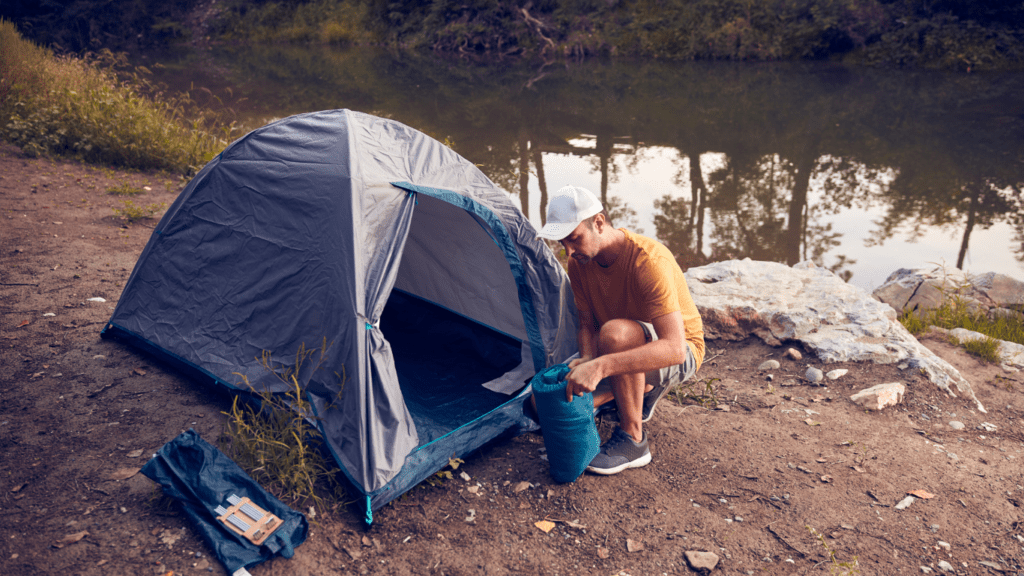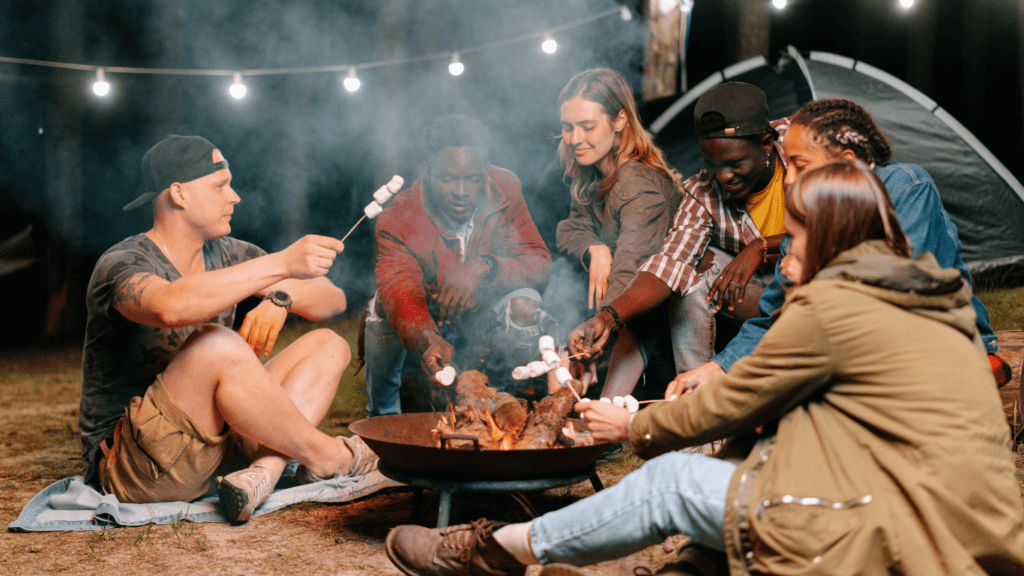Embarking on an overnight backpacking adventure offers a unique experience of connecting with nature, away from the hustle and bustle of everyday life. Setting up camp on the trail is not just about pitching a tent; it’s a ritual that marks the transition from a day of exploration to a night of tranquility under the stars. As I lace up my hiking boots and shoulder my pack, the anticipation of finding the perfect spot to call home for the night fills me with excitement.
Navigating the wilderness to find that ideal camping spot requires a blend of practicality and intuition. From choosing a level ground for a good night’s sleep to ensuring access to essential resources like water, each decision plays a crucial role in creating a comfortable outdoor sanctuary. Join me on this journey as I delve into the art of setting up camp on the trail, where every step brings me closer to the serenity of a night spent in the heart of nature.
Planning Your Overnight Backpacking Trip
When planning my overnight backpacking trip, I always begin by researching the trail I’ll be hiking. It’s essential to know the trail’s length, elevation gain, and terrain to prepare adequately.
Next, I create a detailed packing list, including essentials like a tent, sleeping bag, cooking gear, food, water purification method, and appropriate clothing for the weather conditions.
I also make sure to check the weather forecast for the duration of my trip. Being aware of the expected weather helps me pack the right gear and clothing to stay safe and comfortable on the trail.
Additionally, I plan my route carefully, considering factors like water sources along the trail, potential camping spots, and any relevant permits or regulations for camping in the area.
Lastly, I share my itinerary with a trusted friend or family member, including details of my planned route and estimated return time. Safety is paramount when venturing into the wilderness, and having a reliable support system aware of my plans gives me peace of mind throughout the journey.
Choosing the Right Campsite
When selecting a campsite during an overnight backpacking trip, I consider various crucial factors to ensure a safe and enjoyable experience.
- Terrain: I always look for a flat and level ground to set up my tent. This ensures a comfortable sleep and prevents any discomfort during the night.
- Proximity to Water: It’s essential to choose a campsite close to a water source for cooking, cleaning, and hydration purposes. I prefer to be within a reasonable distance from a freshwater supply.
- Privacy and Seclusion: Opting for a secluded spot away from the main trail or other campers enhances the sense of tranquility and peacefulness during the night.
- Protection from Elements: Selecting a campsite with natural barriers like trees or rocks can provide protection from strong winds and offer some privacy.
- Avoiding Hazards: I steer clear of setting up camp under dead trees, on unstable ground, or near cliffs to ensure safety during the night.
- Leave No Trace Principles: Adhering to Leave No Trace principles, I choose established campsites whenever possible to minimize environmental impact and preserve the natural surroundings for future visitors.
Setting Up Your Camp
When setting up your camp during an overnight backpacking trip, it’s crucial to choose the right campsite to ensure a safe and enjoyable outdoor experience. Factors like terrain, proximity to water sources, privacy, protection from elements, avoiding hazards, and following Leave No Trace principles are key considerations. Select a flat and level ground for pitching your tent, locate a spot close to water, prioritize privacy, and assess natural barriers for added protection. Remember, adhering to Leave No Trace principles by opting for established campsites helps minimize environmental impact and preserves the natural surroundings.
Essential Gear for Overnight Backpacking
When heading out for an overnight backpacking adventure, having the right gear is essential for a safe and comfortable experience. Here are some key items that I always make sure to pack for my trips:
- Backpack: A reliable backpack with proper fit and support is crucial for carrying all your gear comfortably.
- Tent: Choose a lightweight, weather-resistant tent that is easy to set up and provides protection from the elements.
- Sleeping Bag and Sleeping Pad: A warm and cozy sleeping bag, along with a comfortable sleeping pad, ensures a good night’s rest after a day of hiking.
- Cooking Supplies: Carry a compact stove, fuel, cookware, utensils, and food for preparing meals on the trail.
- Water Filtration System: Stay hydrated by bringing a water filtration system or purification tablets to make water safe for drinking.
- Clothing Layers: Pack moisture-wicking clothing, a thermal layer, a rain jacket, and extra socks to stay comfortable in changing weather conditions.
- Headlamp or Flashlight: Essential for navigating in the dark or early morning hours at the campsite.
- First Aid Kit: Include basic first aid supplies like bandages, pain relievers, and blister treatments for any unexpected injuries.
- Navigation Tools: Carry a map, compass, or GPS device to stay on track and navigate the trail effectively.
- Multi-Tool or Knife: Useful for various tasks like gear repair, food preparation, or emergency situations.
Having the right gear not only enhances your camping experience but also ensures you’re prepared for any challenges that may arise during your overnight backpacking trip.



 Ashleyen Gurganusoon, the founder of Terra Tactician Tactics, has always had a profound passion for the great outdoors and a deep-rooted belief in the power of nature to inspire and transform lives. With a background steeped in adventure and exploration, Ashleyen launched Terra Tactician Tactics to share her love for nature and to create a platform where outdoor enthusiasts of all levels can find valuable resources, expert advice, and the latest trends in outdoor activities. Her vision is to empower people to embrace the challenges and beauty of the wild, providing them with the knowledge and confidence to venture safely and enjoyably into nature.
Under Ashleyen’s leadership, Terra Tactician Tactics has become a trusted source for outdoor and survival enthusiasts worldwide. Her dedication to curating high-quality content on camping, hiking, backpacking, fishing, hunting, and adventure travel reflects her unwavering commitment to fostering a community that shares her passion for the outdoors. Ashleyen's approach is driven by her desire to help others experience the joys of nature and adventure while prioritizing safety, sustainability, and respect for the environment. Through Terra Tactician Tactics, she continues to inspire countless individuals.
Ashleyen Gurganusoon, the founder of Terra Tactician Tactics, has always had a profound passion for the great outdoors and a deep-rooted belief in the power of nature to inspire and transform lives. With a background steeped in adventure and exploration, Ashleyen launched Terra Tactician Tactics to share her love for nature and to create a platform where outdoor enthusiasts of all levels can find valuable resources, expert advice, and the latest trends in outdoor activities. Her vision is to empower people to embrace the challenges and beauty of the wild, providing them with the knowledge and confidence to venture safely and enjoyably into nature.
Under Ashleyen’s leadership, Terra Tactician Tactics has become a trusted source for outdoor and survival enthusiasts worldwide. Her dedication to curating high-quality content on camping, hiking, backpacking, fishing, hunting, and adventure travel reflects her unwavering commitment to fostering a community that shares her passion for the outdoors. Ashleyen's approach is driven by her desire to help others experience the joys of nature and adventure while prioritizing safety, sustainability, and respect for the environment. Through Terra Tactician Tactics, she continues to inspire countless individuals.